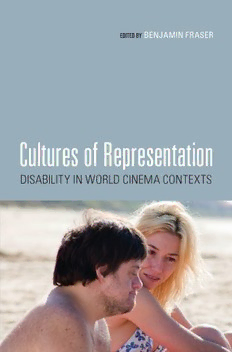
Cultures of Representation: Disability in World Cinema Contexts PDF
Preview Cultures of Representation: Disability in World Cinema Contexts
EDITED BY BENJAMIN FRASER Cultures of Representation DISABILITY IN WORLD CINEMA CONTEXTS Cultures of Representation Cultures of Representation DISABILITY IN WORLD CINEMA CONTEXTS EDITED BY BENJAMIN FRASER WALLFLOWER PRESS LONDON & NEW YORK A Wallflower Press Book Wallflower Press is an imprint of Columbia University Press publishers since 1893 New York cup.columbia.edu Copyright © 2016 Columbia University Press All rights reserved Wallflower Press® is a registered trademark of Columbia University Press A complete CIP record is available from the Library of Congress ISBN 978-0-231-17748-1 (cloth : alk. paper) ISBN 978-0-231-17749-8 (pbk. : alk. paper) ISBN 978-0-231-85096-4 (e-book) Cover image: Yo, También (2009) © Olive Films Columbia University Press books are printed on permanent and durable acid-free paper. This book is printed on paper with recycled content. Printed in the United States of America c 10 9 8 7 6 5 4 3 2 1 p 10 9 8 7 6 5 4 3 2 1 Contents acknowledgements ............................................................. vii notes on contributors ...................................................... ix Introduction Disability Studies, World Cinema and the Cognitive Code of Reality Benjamin Fraser .............................................................................. 1 Global In(ter)dependent Disability Cinema Targeting Ephemeral Domains of Belief and Cultivating Aficionados of the Body David T. Mitchell and Sharon L. Snyder ............................................ 18 ‘Beyond Forgiveness’? Lee Chang-dong’s Oasis (2002) and the Mobilisation of Disability Discourses in the Korean New Wave Paul Petrovic .................................................................................. 33 Refusing Chromosomal Pairing Inclusion, Disabled Masculinity, Sexuality and Intimacy in Yo, también (2009) Michael Gill ................................................................................... 47 Dunce! Duffer! Dimwit! Dyslexia in Bollywood’s Taare Zameen Par (2007) Sanjukta Ghosh .............................................................................. 63 Landscapes of Children Picturing Disability in Buñuel’s Los olvidados (1950) Susan Antebi .................................................................................. 78 Fearful Reflections Representations of Disability in Postwar Dutch Cinema (1973–2011) Mitzi Waltz .................................................................................... 93 ‘People Endure’ The Function of Autism in Anton’s Right Here (2012) José Alaniz ..................................................................................... 110 Displaying Autism The Thinking and Images of Temple Grandin (2010) Katherine Lashley .......................................................................... 126 More than the ‘Other’? On Four Tendencies Regarding the Representation of Disability in Contemporary German Film (2005–2010) Petra Anders .................................................................................. 141 The Other Body Psychiatric Disability and Pedro Almodóvar (1988–2011) Candace Skibba ............................................................................. 157 On the Road to Normalcy European Road Movies and Disability (2002–2011) Anna Grebe .................................................................................... 173 Re-envisioning Italy’s ‘New Man’ in Bella non piangere! (1955) Jennifer Griffiths ............................................................................ 187 ‘Get Your Legs Back’ Avatar (2009) and the Re-booting of American Individualism Susan Flynn ................................................................................... 200 Through the Disability Lens Revisiting Ousmane Sembène’s Xala (1975) and Camp de Thiaroye (1988) Ken Junior Lipenga ........................................................................ 216 Homes Wretched and Wrecked Disability as Social Dis-ease in Kurosawa’s Dodes’ka-den (1970) James A. Wren ............................................................................... 230 Leprosy and the Dialectical Body in Forugh Farrokhzad’s The House is Black (1964) Rosa Holman ................................................................................. 247 index .......................................................................................... 263 Acknowledgements I have drawn inspiration and received encouragement from many teacher- scholars and colleagues during my years at College of Charleston and now East Carolina University who deserve my thanks, whether for collaborative efforts on disability film series, conversations or both: Nancy Ausherman, Martha Chapin, Liz Johnston, Morgan Koerner, Cindy May, Marylaura Papa- las, Alison Piepmeier, Steve Sligar and Alison Smith. Thanks also to the Film Studies folks at ECU, particularly Anna Froula, Amanda Klein and Justin Wilmes. Special thanks to all those seeking to bring Hispanic Studies into dialogue with Disability Studies as an interdisciplinary area – above all Su- san Antebi, Encarnación Juárez Almendros and Matthew Marr, but also Julie Avril Minich and Victoria Rivera-Cordero. Thanks too to the graduate stu- dents and faculty at the University of Illinois for an invitation to speak there on disability and Spanish cultural production in 2015, which proved very en- couraging. I am most grateful to Abby, Ben and Judd, from whom I continue to learn much about disability and society outside of academic contexts. vii Notes on Contributors JOSE ALANIZ is associate professor in the Department of Slavic Languages and Literatures and the Department of Comparative Literature (adjunct), and director of the Disability Studies Program at the University of Washington – Seattle. He is the author of Komiks: Comic Art in Russia (University Press of Mississippi, 2010) and Death, Disability and the Superhero: The Silver Age and Beyond (University Press of Mississippi, 2014). PETRA ANDERS is a lecturer at Ostfalia University of Applied Science, Wolfenbüttel, Germany. She is the author of Behinderung und psychische Krankheit im zeitgenössischen deutschen Spielfilm. Eine vergleichende Filma- nalyse (Königshausen & Neumann, 2014). SUSAN ANTEBI is associate professor of Spanish and director of the Latin American Studies Program at the University of Toronto. She is the author of Carnal Inscriptions: Spanish American Narratives of Corporeal Difference and Disability (Palgrave Macmillan, 2009) and co-editor, with Beth Jörgensen, of Libre Acceso: Latin American Literature and Film through Disability Studies (SUNY Press, 2016). SUSAN FLYNN is a doctoral graduate of the Equality Studies Centre at the School of Social Justice, University College Dublin, and a lecturer in media and cultural studies at the University of the Arts, London. She has published in a range of international journals including the American, British and Ca- nadian Studies Journal and Considering Disability Journal. BENJAMIN FRASER is professor of Hispanic Studies and chair of Foreign Languages and Literatures at East Carolina University in North Carolina. He is the author of, amongst other publications, Deaf History and Culture in Spain (Gallaudet University Press, 2009) and Disability Studies and Spanish ix
